|
|
|
Sort Order |
|
|
|
Items / Page
|
|
|
|
|
|
|
| Srl | Item |
| 1 |
ID:
141535
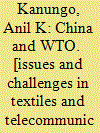

|
|
|
|
|
| Edition |
1st ed.
|
| Publication |
DelhI, Shipra Publications, 2015.
|
| Description |
x, 198p.hbk
|
| Standard Number |
9788175417946
|
|
|
|
|
|
|
|
|
|
|
|
Copies: C:1/I:0,R:0,Q:0
Circulation
| Accession# | Call# | Current Location | Status | Policy | Location |
| 058336 | 382.920951/KAN 058336 | Main | On Shelf | General | |
|
|
|
|
| 2 |
ID:
129738
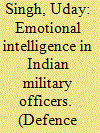

|
|
|
| 3 |
ID:
141214
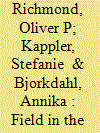

|
|
|
|
|
| Summary/Abstract |
This article highlights the semantic and socio-political meaning of the ‘field’ as it is used in both academic research and policy practices: as a geographic and material space related to forms of intervention in International Relations (IR), and not as a disciplinary space. We argue that the notion of the ‘field’ carries colonial baggage in terms of denoting ‘backwardness’ and conflictual practices, as well as legitimising the need for intervention by peacebuilding, statebuilding, and development actors located outside the field. We also show how academic practices have tended to create a semiotic frame in which the inhabitants of the research and intervention space are kept at a distance from the researcher, and discursively stripped of their agency. Along similar lines, policy-practice has reinforced the notion of the field as being in need of intervention, making it subject to external control. This article suggests that the agency of the inhabitants of the field has to be re-cognised and de-colonised so that political legitimacy can be recovered from ‘intervention’.
|
|
|
|
|
|
|
|
|
|
|
|
|
|
|
|
| 4 |
ID:
033831


|
|
|
|
|
| Publication |
New Delhi, Ess Ess publication, 1985.
|
| Description |
xii,519p
|
| Standard Number |
817000005x
|
|
|
|
|
|
|
|
|
|
|
|
Copies: C:1/I:0,R:0,Q:0
Circulation
| Accession# | Call# | Current Location | Status | Policy | Location |
| 026147 | 001.42/KHA 026147 | Main | On Shelf | General | |
|
|
|
|
| 5 |
ID:
114515
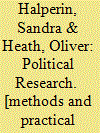

|
|
|
|
|
| Publication |
Oxford, Oxford University Press, 2012.
|
| Description |
xiv, 440p.Pbk
|
| Standard Number |
9780199558414
|
|
|
|
|
|
|
|
|
|
|
|
Copies: C:1/I:0,R:0,Q:0
Circulation
| Accession# | Call# | Current Location | Status | Policy | Location |
| 056784 | 320.072/HAL 056784 | Main | On Shelf | General | |
|
|
|
|
| 6 |
ID:
079378


|
|
|
|
|
| Publication |
London, Facet Publishing, 2007.
|
| Description |
xvii, 329p.
|
| Standard Number |
9781856045452
|
|
|
|
|
|
|
|
|
|
|
|
Copies: C:1/I:0,R:0,Q:0
Circulation
| Accession# | Call# | Current Location | Status | Policy | Location |
| 052690 | 020.72/PIC 052690 | Main | On Shelf | General | |
|
|
|
|
| 7 |
ID:
078286
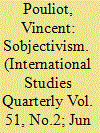

|
|
|
|
|
| Publication |
2007.
|
| Summary/Abstract |
This article outlines a "sobjectivist" methodology that is specifically geared toward the constructivist style of reasoning. The main argument is that constructivist inquiries need to develop not only objectified (or experience-distant) but also subjective (experience-near) knowledge about social and international life. This requirement derives from the fact that constructivism is a postfoundationalist style of reasoning which emphasizes the mutually constitutive dialectics between the social construction of knowledge and the construction of social reality. By implication, a constructivist methodology should be inductive, interpretive, and historical. The methodical practice of sobjectivism follows a three-step logic from the recovery of subjective meanings to their objectification thanks to contextualization and historicization. A brief discussion of the security-community research program illustrates what sobjectivism looks like in practice. Overall, not only does the development of a consistent methodology systematize the practice of constructivist research, it also fosters engagement and dialog with other international relations approaches. By clarifying where constructivism falls on issues of validity, falsifiability, and generalizability, this article intends to enhance mutual legibility among competing methodologies.
|
|
|
|
|
|
|
|
|
|
|
|
|
|
|
|
| 8 |
ID:
167633


|
|
|
|
|
| Summary/Abstract |
This article examines the use of North Korean defectors’ accounts as a source of information for studying the Democratic People’s Republic of Korea (DPRK). Information from defectors fills a vital knowledge gap and improves our understanding of North Korean politics, economics, and society. Witness accounts and interview data collected from people who were born in North Korea but have since left have been widely used by journalists, government agencies, international organizations, non-governmental organizations, and academics. There are, however, serious methodological issues in collecting, organizing, and interpreting information derived from defectors’ accounts. Selection and demographic biases, power relations between researchers and interviewees, monetary incentives, and language barriers are among those issues. We propose focus group discussions and participatory observation as complementary methods of data collection to mitigate the shortfalls of relying on individual interviews.
|
|
|
|
|
|
|
|
|
|
|
|
|
|
|
|
| 9 |
ID:
091986
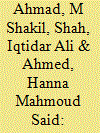

|
|
|
|
|
| Publication |
2009.
|
| Summary/Abstract |
Around the mid-1970s there was a growing awareness that various approaches for rural development such as development based on basic needs, community development and integrated rural development did not result in substantial rural poverty alleviation.
|
|
|
|
|
|
|
|
|
|
|
|
|
|
|
|
| 10 |
ID:
093446


|
|
|
| 11 |
ID:
100199
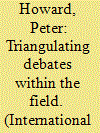

|
|
|
|
|
| Publication |
2010.
|
| Summary/Abstract |
Undergraduate introductory methods courses offer a unique opportunity to bring methodological pluralism to the field by teaching students multiple approaches to research. This article presents one way to organize an introductory undergraduate research methods course. By focusing on central debates between methodological approaches on issues of causality, context, and essentialism, an instructor can introduce positivism, interpretivism, and relationalism as distinct, coherent methodological approaches to research. Depicting these three debates and three approaches graphically on a triangle can illuminate some core methodological debates within the field today. It also illuminates the methodological underpinnings of many of the discipline's theoretical debates.
|
|
|
|
|
|
|
|
|
|
|
|
|
|
|
|
| 12 |
ID:
193228
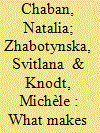

|
|
|
|
|
| Summary/Abstract |
Contributing to the ‘narrative turn’ in International Relations and offering an answer to the question ‘What makes a strategic narrative efficient?’, this article adds to the methodological theorization of the formation and projection phases of the narrative’s lifecycle. We suggest that the impact of the constructed image in the narrative can be reinforced by the interplay of at least three projection properties: (1) content accentuation and priming, through iterations; (2) content contextualization, through historical and cultural resonance with the consumers’ memories; and (3) content verbalization, through narrative tactics that evoke a range of the consumers’ involved attitudes to the framed image. These properties, being intrinsic ingredients of the projected content, tend to enhance emotions. In our work, they get traction in the antagonistic narrative tailored by the Russian propaganda to depict Ukraine orientated towards the European Union (EU). The empirical case study analyses articles published on the Russian e-news platforms portraying the EU granting Ukrainians visa-free travel to the Schengen area in 2017, a milestone in Ukraine–EU relations. We define Russia’s narrative, created in reaction to this event, as antagonistic and consider it to be a precursor of the aggressive narrative crafted/employed by Russia to justify its 2022 military assault on Ukraine’s sovereignty.
|
|
|
|
|
|
|
|
|
|
|
|
|
|
|
|
| 13 |
ID:
146215
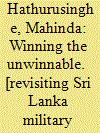

|
|
|
|
|
| Publication |
New Delhi, KW Publishers Pvt Ltd, 2016.
|
| Description |
viii, 191p.hbk
|
| Standard Number |
9789383649938
|
|
|
|
|
|
|
|
|
|
|
|
Copies: C:1/I:0,R:0,Q:0
Circulation
| Accession# | Call# | Current Location | Status | Policy | Location |
| 058735 | 355.033505493/HAT 058735 | Main | On Shelf | General | |
|
|
|
|
|
|
|
|
|